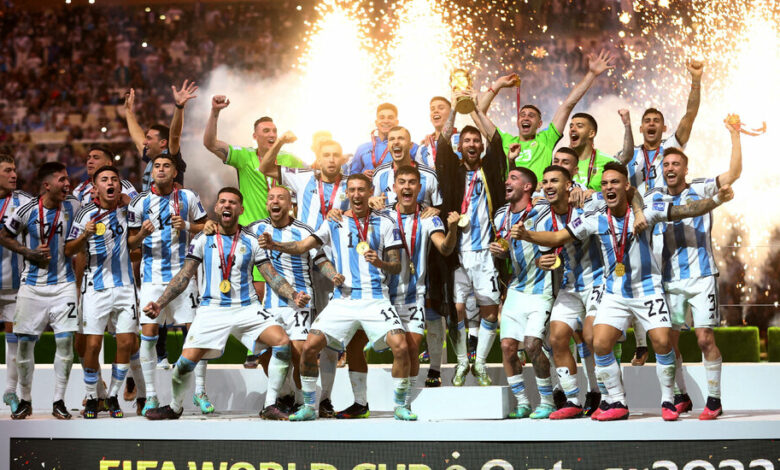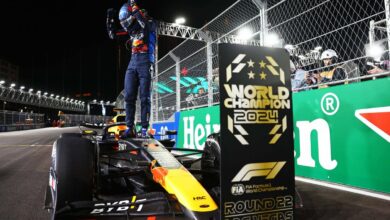Saudi Arabia confirmed as sole bidder for 2034 World Cup

Saudi Arabia emerged as the likely winner in the abbreviated race to host the 2034 World Cup on Tuesday after Football Federation Australia announced it would not bid for the tournament. The decision removed the only potential hurdle standing in the way of Saudi Arabia bringing the world’s most-watched sporting event back to the Gulf.
Australia announced its decision hours before the deadline set by soccer’s governing body FIFA for countries to express interest in hosting the World Cup. Saudi Arabia made it clear weeks ago that it intended to bid, and FIFA’s rules — and powerful allies — have made it all but certain that the kingdom will prevail.
In a sudden and surprising move earlier this month, FIFA announced a shortened bidding period for the 2034 tournament, giving interested countries just 25 days to formally declare their interest and provide extensive declarations of government support for a 48-team, multi-city event that normally requires billions of dollars and years of planning.
The decision to shorten that timeline to just a matter of weeks was made public on the same day that FIFA formally announced that the 2030 World Cup would be shared between countries in Europe, Africa and South America. Football governing bodies were only made aware of the possibility a week before the decision was confirmed.
FIFA’s move to accelerate the bidding for 2034 came as a surprise to many, coming 11 years before the tournament was scheduled to start and a whopping three years before the 2034 host was to be determined. FIFA also said that only bidders from Asia and Oceania, two of football’s six regional confederations, would be eligible for selection, and on Tuesday night it confirmed that Saudi Arabia was the only bidder.
Saudi Arabia had been open about its desire to host the World Cup for years, and it moved quickly to secure the tournament after FIFA finalized the rules this month. Its de facto leader, Crown Prince Mohammed bin Salman, declared the kingdom’s intention to bid within minutes of FIFA’s announcement of the official timeline, and within hours the Saudis had secured the backing of Asian football’s supreme leader, Sheikh Salman bin Ibrahim al Khalifa of Bahrain, who announced that “the entire Asian football family” – a group which includes Australia – “will stand united in support” of the Saudi bid.
Australian officials concluded they would be outmatched if they tried to challenge Saudi Arabia for the votes of a majority of FIFA’s 211 federations. Saudi Arabia has signed deals with dozens of FIFA member states in the past year, pledging millions of dollars for projects in Asia and focusing heavily on Africa, where it signed a deal with the regional governing body and sponsored a new tournament.
Contacts with football executives have ranged from the high-profile to the personal: At an event for football officials in Tashkent, Uzbekistan, earlier this month, organizers announced that the Saudi Football Federation would foot the delegates’ daily bill.
With little hope of countering the Saudi influence and support, the Australian federation announced it was withdrawing and would instead focus on other events.
“We wish FIFA and the eventual hosts of the 2034 FIFA World Cup the utmost success for the good of the sport and for all who love our sport,” the Australian federation said in a statement on its website.
According to FIFA, the final announcement of the host for 2034 will be made in the fourth quarter of 2024.
Saudi Arabia has gone from an international sports backwater to one of its biggest players in just a few years, using its vast oil wealth to land top stars in its cash-strapped soccer league; secure the biggest fights in boxing; and strike a deal to effectively seize control of the global game of golf. All of the investments are seen as part of a broader plan to change the kingdom’s perception on the world stage and diversify its economy away from oil.
But inviting the World Cup – and the criticism that would bring – would be one of the boldest moves yet.
Neighbouring Qatar has been in the international spotlight for more than a decade after it won the hosting rights to the 2022 World Cup, making it the first Arab and Muslim country to host the event.
That tournament was not without controversy. For years, the lead-up was marked by criticism of the tiny gas-rich state’s treatment of the millions of migrant workers needed to reform the country for the World Cup. Saudi Arabia, though far more established on the world stage than Qatar, will surely face similar criticism.
Human rights groups wasted no time in criticizing FIFA. Minky Worden, director of global initiatives at Human Rights Watch, an advocacy group, said that FIFA had announced as early as 2016 that “human rights due diligence would be conducted prior to future World Cups.”
“FIFA has effectively removed all pressure on Saudi Arabia and MBS to implement human rights reforms, thereby squandering the leverage on labor, press freedom and civil society protections that exist because Saudi Arabia is desperate to host the World Cup,” Ms. Worden said in an email.
Yet FIFA’s bidding requirements were such that they almost matched Saudi Arabia’s current state of readiness. A requirement that candidate countries for the 2034 World Cup already have at least seven tournament-ready stadiums was reduced to four, the exact number available in Saudi Arabia.
As the only bidder in FIFA’s fast-track process, Saudi Arabia also avoids the politically risky practices that landed the organisation in reputation-destroying corruption claims in 2010 when it hosted simultaneous races for the 2018 and 2022 events secured by Russia and Qatar.
Australia, one of the losing bidders at the time, had spent more than $30 million of largely public money and secured just one vote, an outcome that left scars on the football and political officials involved. Memories of that bitter and expensive failure led to the decision to walk away this time.




